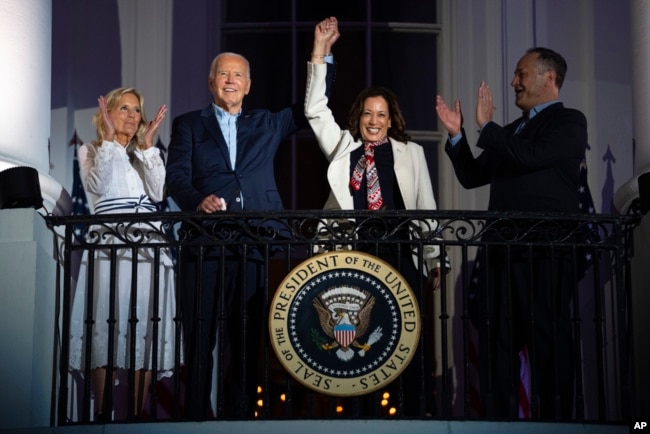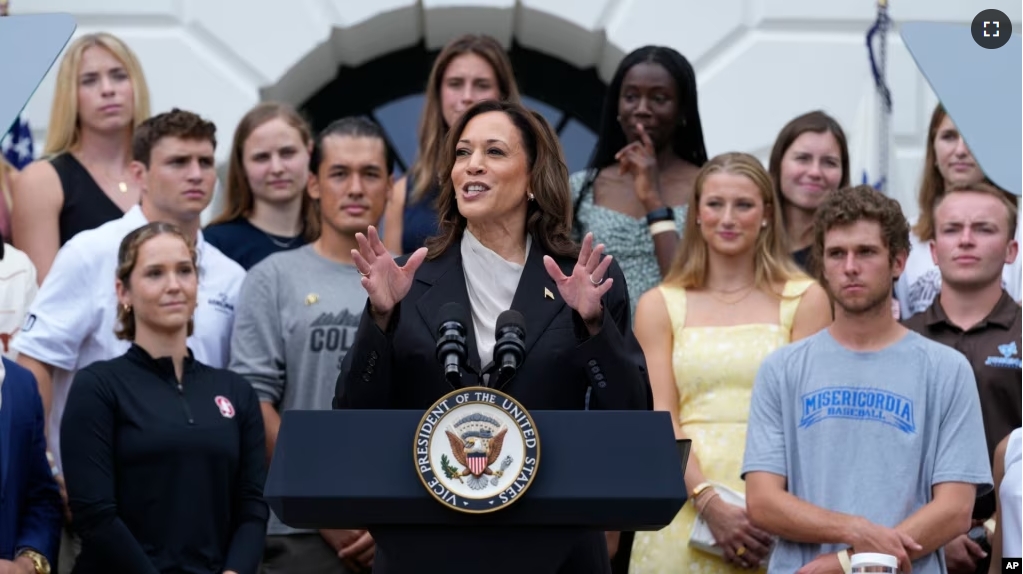Democratic Party lawmakers, some governors, and financial donors are supporting U.S. Vice President Kamala Harris to be the party’s presidential nominee.
The move came shortly after President Joe Biden said on Sunday that he would not seek the presidency again. Biden made the surprise announcement on the social media website X. He also endorsed, or threw his support to, Harris.
Harris, who is 59 years old, quickly announced that she would seek the nomination. She said, “I will do everything in my power to unite the Democratic Party – and unite our nation – to defeat Donald Trump.”
Last week, former President Donald Trump accepted the nomination of the Republican Party in the Midwestern city of Milwaukee, Wisconsin. He chose Ohio Senator J.D. Vance as his vice-presidential nominee.
Biden’s decision
Biden’s decision to leave the 2024 race followed rising calls from Democrats urging him to “pass the torch” to a new generation.
In his June 27 debate against Trump, the 81-year-old president often appeared to be unable to complete his thoughts. He also failed to press his case against the 78-year-old Trump or defend his work in The White House. Despite concerns from Democrats about his debate performance and decreasing electoral support, Biden said he would stay in the race.
But on Sunday, he said in a statement, “I believe it is in the best interest of my party and the country for me to stand down and to focus solely on fulfilling my duties as president for the remainder of my term.” Biden’s term ends in six months in January. Biden added that he plans to address the nation about his decision later this week.
In a statement, Harris spoke about Biden’s withdrawal. She said, Biden “is doing what he has done throughout this life of service: putting the American people and our country above everything else.”
The decision came just weeks before the start of the Democratic National Convention in Chicago on August 19. That is the event where the Democratic Party officially decides on its nominee. Before Biden’s withdrawal, the party was considering a virtual vote for delegates before the convention.

Harris’ many firsts
Before becoming vice president, Harris served as Attorney General, a top law enforcement position, in the state of California. In 2017, she was elected to the U.S. Senate. Biden chose her in 2020 as a running mate after her own presidential campaign failed to gain enough support.
If Harris is nominated by the Democratic Party to replace Biden, she would be the first Black woman and South Asian major party presidential nominee in the 248-year history of the United States.
Harris’s public approval rating has largely followed the president’s approval numbers. Some opinion studies say Harris has a little more support than Biden when compared to Trump.
As vice president, one of her early assignments was to deal with the causes of migration in the country’s southern border with Mexico. Harris also oversaw the administration’s efforts on voting rights and election reforms. With a divided Congress, however, Harris was not able to achieve results.
Since the U.S. Supreme Court overturned federal protections for abortion rights in June 2022, Harris has been the leading voice to push for greater access.
To mark the second anniversary of the court decision, Harris told supporters in Maryland, “This is a fight for freedom: the fundamental freedom of a woman to make decisions about her own body and not having her government tell her what to do.”
I’m Jill Robbins.
Mario Ritter, Jr. adapted this VOANEWS report for VOA Learning English.
________________________________________________
Words in This Story
endorse –v. to publicly give support to a political candidate
torch –n. a fire or electric device that is used to light the way
stand down –v. (phrasal) to not take part in something because of a request to do so
virtual –adj. meeting by video conference call rather than physically in a central place
achieve –v. to be able to do something; to reach a goal
access –n. the ability to get something
